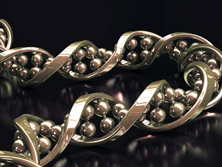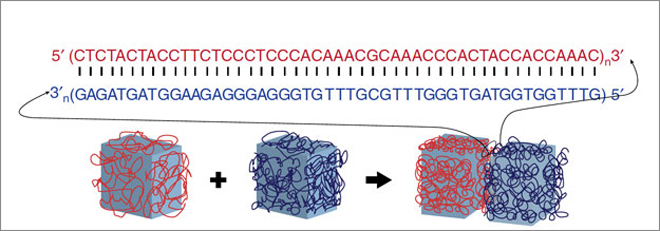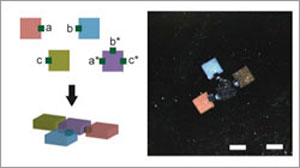Wyss Institute Researchers Create Programmable Smart Glue From DNA


DNA makes glue programmable because one strand of DNA will stick tightly to a matching partner strand, but only if the two strands have chemical “letters,” or nucleotides, that are complementary (A to T, C to G). Gel bricks coated with matching strands of DNA adhere specifically to each other.
Researchers at the Wyss Institute for Biologically Inspired Engineering at Harvard University have developed a new programmable smart glue made of DNA that can aid tiny bricks to self assemble into complex objects. DNA is an ideal choice for the world’s first programmable glue because of the specificity of the base;. A binds to T and G to C.

Gel bricks smaller than a grain of sand (top left) can be programmed to self-assemble into complex structures. The key is attaching connector cubes coated with matching DNA glue to the gel bricks that are meant to pair up.
These complex structures are formed by self assembling small hydrogel bricks. Researchers have exploited the specificity of DNA bases to bind with its complimentary pair to create snippet DNA strands of particular sequences. These snippet DNAs are then multiplied using enzymes to create long pieces of “giant DNA” having repeating snippet DNA sequence. The giant DNA is coated onto the surface of these tiny hydrogel bricks which then adhered only to those with the complimentary giant DNA coating. By creating snippets of DNA with sequence of choice, scientists were able to program the DNA glue.
In order to create larger complex structures, smaller hydrogel bricks coated with the DNA smart glue are used as connector cubes. The desired connector cubes are attached to the faces of larger cubes allowing these connector cubes to adhere only to its matching connector cube stuck to other larger cubes, thus programming the DNA glue to create complex structures of choice out of large hydrogel bricks.
This self assembly method has the potential of solving the issues faced in tissue engineering for regrowing tissues or organs by injecting tiny particles that can reassemble itself into complex structures inside the body, at the site of injury to form biocompatible scaffolds. The hydrogel bricks can be replaced with other materials, using the same concept to create different self assembled structures of choice.
Source: Wyss Institute
